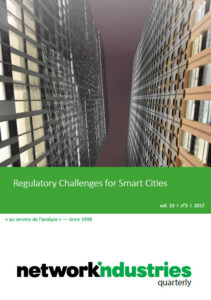
Read more
Network Industries
Network Industries Quarterly, Vol. 19, No. 3 – Regulatory Challenges for Smart Cities
This issue of the Network Industries Quarterly looks into the regulatory challenges facing the development of smart cities. With the acceleration of technological developments in network industries and, in particular, in infrastructures, there is...
The Robert Schuman Centre for Advanced Studies is pleased to announce the second Florence Competition Programme Annual Conference, which will take place at the European University Institute in Florence on 20 and 21 October 2017. The event aims to gather academics, practitioners, official from National Competition Authorities (NCAs) and representatives of the industry in order to discuss the future of antitrust enforcement in the light of the growing anti-globalisation movements around the world.
The past 30 years have witnessed the rapid globalisation of the economy: international trade has been liberalised, a number of industries previously reserved to State-owned monopolies have been opende up to free competition, while FDIs have been incentivised in most of the countries of the world. In this context, antitrust law has flourished; in particular, a number of Asian countries have adopted antitrust law inspired by the US antitrust and EU competition model. During the past years, however, the globalisation paradigm has been increasingly criticised by a number of populist parties on both sides of the Atlantic: the on-going economic crisis has revamped nationalism, trade protectionism and a request for a stronger State intervention in the market.
The second FCP Annual Conference aims to discuss the future of antitrust enforcement in the aftermath of the election of Trump in the US and Brexit in Europe. On the one hand, the question is whether the claim by the Trump administration to protect American firms from “unfair” competition by foreign companies (i.e. America first) will lead to a change in pattern of antitrust enforcement in the US in the coming years. On the other hand, the question is what might be the impact of Brexit on EU competition policy enforcement. In case of a “hard Brexit”, the mutual recognition of court rulings introduced by Brussels Regulation will not be applicable to decisions ruled by British tribunals, thus creating new challenges in cross-border cases of private enforcement of EU competition law. Moreover, after Brexit, the UK will not be subject to EU Commission’s scrutiny in the field of State Aid policy, generating a risk of new subsidy wars in Europe. Finally the Annual Conference will also discuss the impact of anti-globalisation movements on the future of antitrust enforcement in other regions of the world, focusing in particular on Asian countries.
For further information on how to become a donor of the Florence Competition Programme, please see here.
Presentations
Tim Brennan
Antonio Capobianco
Leigh Hancher
Pablo Ibànez-Colomo
Thomas Jeitschko
Enzo Marasà
Giorgio Monti
Semin Park
Vincent Verouden
Mark Williams

